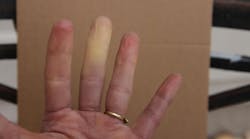Work too hard to get patients to like you? There's a better way
Listen to the article on our podcast!
How many times have we heard, “They’ll never care how much you know until they know how much you care”? And how many times have we been told we need to develop relationships with patients, and make them like and trust us, before they’ll accept treatment plans?
Many of us use “cheat sheets” with patients—we write down little personal notes to refer to the next time we see them. Six months later, at their next recall appointment, we might say, “Hi, Beth. How was your trip to the Bahamas?” (even though we had totally forgotten about it). And Beth will say, “Wow! You remembered!” and then happily describe her trip. We’re taught to sit at eye level with patients, create a quiet and calm atmosphere, and use the correct body language. We do all these things to instill trust and put patients at ease.
Many of us are people pleasers by nature, and we want patients to like us. It’s much nicer to hear “Don’t ever retire” than “I hate coming to the dentist.” And it’s true that patients will accept treatment more readily from people they like and trust.
I’m not saying these approaches are wrong; in fact, I’ve used some of them myself. But every once in a while, when I’m told to use a script in patient interactions or I read statements like this—“By earning their trust, they will believe that the treatment plans you recommend are the best and most appropriate path for them”—I feel a little uneasy. Sometimes I sense a little disingenuousness in these statements, especially in the context of an article that’s telling dentists how to increase their profits.
We’re told the lifetime value of a patient is X dollars, as if a patient’s value is strictly monetary. More than once I’ve heard the hygiene department referred to as a loss-leader, implying its value does not lie so much in helping patients achieve and maintain oral and systemic health as in selling dentistry. Are we losing our focus a bit?
Please don’t misunderstand me. I do understand that dentistry is a business, and if dentists can’t get patients to accept treatment plans, the practice, as well as the patients, will suffer. Also, there’s nothing inherently wrong in getting patients to like us. I don’t want to be judgmental, but sometimes I sense that we’re using tips and tricks to get patients to like us not primarily for the good of the patient, but to increase profits. It almost seems that we’re being told to trick patients into liking and trusting us so they’ll buy what we’re selling.
Three types of dental patients
As a hygienist who has seen thousands of patients over the course of my 46-year career, I’ve concluded that there are three groups of people who come to the dental office. The first group, the largest by far, consists of those who are pleasant, even if it’s not their favorite place to be. The second, much smaller group, are those who absolutely love coming to the dental office (a fact that shocked me early in my career). These two groups represent generally likeable patients with whom it’s usually easy to develop rapport. Then there’s the third group—those who are not just difficult, but downright unpleasant.
I’ve witnessed plenty of dental practitioners griping about this third group of patients. I get that. Some people are simply difficult to like. I admit to griping sometimes myself. So, how do we get these people to like us when we don’t like them, if that’s the path to treatment acceptance? Do we try to fool them into believing that we like them? Certainly we can’t let them know how we really feel about them, how merely seeing their name on the schedule increases our anxiety before they’re even in the chair.
A change in mindset
It may be time for a change in mindset. The goal should not be to make patients like us so they’ll accept treatment. Patients are not valuable because of the money they can send our way. Their value lies simply in being human beings … even the unpleasant ones. The truth is we don’t need to like them, and we don’t need to strive to make them like us. What we do need to recognize is that all people are inherently valuable and should be treated with genuine respect for that reason alone.
This may not seem like much of a mindset change, but it’s helped me tremendously. I began my career as a people pleaser. I was devastated when I sensed patients didn’t like me or requested to see the other hygienist. I did everything I could to make them happy in my chair. Most of the time, it worked. But sometimes I recognized that I was acting like I really liked someone whom I secretly disliked. That didn’t feel authentic, and it bothered me.
It took me many years to realize that my drive to make patients (and people in general) like me was not that I liked every single person. It was also not to get patients to accept treatment plans. I was a people pleaser due to my own insecurity. I needed people to like me to feel good about myself. Once I realized that, I was able to step away from the idea of trying to make all people like me, which is a futile endeavor.
I began thinking of patients in terms of their value as human beings. I tried to imagine each unpleasant person as a little baby, loved by their mother. I knew something must have happened in their life to cause them to change from that sweet innocent baby to an unpleasant adult, and whatever that something was, it must have been difficult for them. This way of thinking evokes compassion, and compassion evokes kindness. Showing kindness often evokes gratitude and a shift in attitude on the part of the unpleasant patient, making them easier to deal with.
I no longer feel that I have to like every single patient or make every patient like me. That thinking led to a feeling of disingenuousness and defeat. Instead, I now attempt to treat every patient with respect. Yes, that does lead to trust on the patient’s part, which does lead to more case acceptance. But that’s not my goal.
The reward to me is that I feel more authentic and I recognize that my worth as a hygienist is not dependent on people liking me or reaching some financial goal, but in the services I provide, making patients look better and feel better, both orally and emotionally. By recognizing the worth of every single patient—not for the money they bring into the practice, but for who they are as human beings—I recognize my own worth.
Editor's note: This article appeared in the August/September 2024 print edition of RDH magazine. Dental hygienists in North America are eligible for a complimentary print subscription. Sign up here.
About the Author
Kirsten Brancheau, BA, RDH
Kirsten Brancheau, BA, RDH, practiced clinical dental hygiene from 1978 until her retirement in 2025. She continues to work occasionally as a temp. Kirsten earned an associate’s degree in applied science in dental hygiene from Union County College and a bachelor of arts degree in English literature from Montclair State University. She is a member of the American Dental Hygienists’ Association. Kirsten is also a freelance proofreader, editor, and writer. She can be reached at [email protected].



